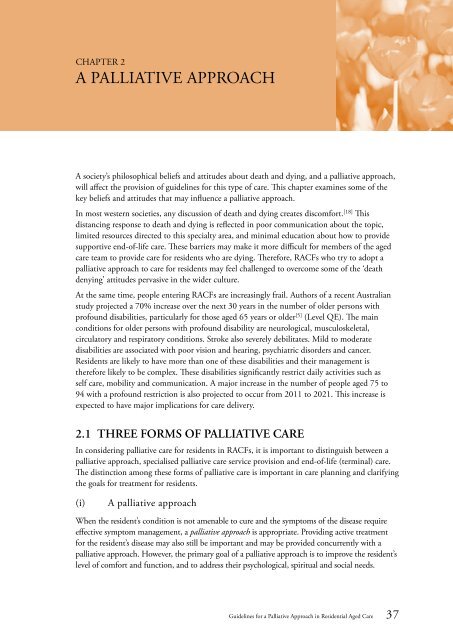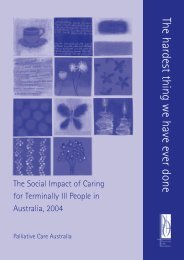Guidelines for a Palliative Approach in Residential Aged Care
Guidelines for a Palliative Approach in Residential Aged Care
Guidelines for a Palliative Approach in Residential Aged Care
Create successful ePaper yourself
Turn your PDF publications into a flip-book with our unique Google optimized e-Paper software.
CHAPTER 2<br />
A PALLIATIVE APPROACH<br />
A society’s philosophical beliefs and attitudes about death and dy<strong>in</strong>g, and a palliative approach,<br />
will affect the provision of guidel<strong>in</strong>es <strong>for</strong> this type of care. This chapter exam<strong>in</strong>es some of the<br />
key beliefs and attitudes that may <strong>in</strong>fluence a palliative approach.<br />
In most western societies, any discussion of death and dy<strong>in</strong>g creates discom<strong>for</strong>t. [18] This<br />
distanc<strong>in</strong>g response to death and dy<strong>in</strong>g is reflected <strong>in</strong> poor communication about the topic,<br />
limited resources directed to this specialty area, and m<strong>in</strong>imal education about how to provide<br />
supportive end-of-life care. These barriers may make it more difficult <strong>for</strong> members of the aged<br />
care team to provide care <strong>for</strong> residents who are dy<strong>in</strong>g. There<strong>for</strong>e, RACFs who try to adopt a<br />
palliative approach to care <strong>for</strong> residents may feel challenged to overcome some of the ‘death<br />
deny<strong>in</strong>g’ attitudes pervasive <strong>in</strong> the wider culture.<br />
At the same time, people enter<strong>in</strong>g RACFs are <strong>in</strong>creas<strong>in</strong>gly frail. Authors of a recent Australian<br />
study projected a 70% <strong>in</strong>crease over the next 30 years <strong>in</strong> the number of older persons with<br />
profound disabilities, particularly <strong>for</strong> those aged 65 years or older [5] (Level QE). The ma<strong>in</strong><br />
conditions <strong>for</strong> older persons with profound disability are neurological, musculoskeletal,<br />
circulatory and respiratory conditions. Stroke also severely debilitates. Mild to moderate<br />
disabilities are associated with poor vision and hear<strong>in</strong>g, psychiatric disorders and cancer.<br />
Residents are likely to have more than one of these disabilities and their management is<br />
there<strong>for</strong>e likely to be complex. These disabilities significantly restrict daily activities such as<br />
self care, mobility and communication. A major <strong>in</strong>crease <strong>in</strong> the number of people aged 75 to<br />
94 with a profound restriction is also projected to occur from 2011 to 2021. This <strong>in</strong>crease is<br />
expected to have major implications <strong>for</strong> care delivery.<br />
2.1 THREE FORMS OF PALLIATIVE CARE<br />
In consider<strong>in</strong>g palliative care <strong>for</strong> residents <strong>in</strong> RACFs, it is important to dist<strong>in</strong>guish between a<br />
palliative approach, specialised palliative care service provision and end-of-life (term<strong>in</strong>al) care.<br />
The dist<strong>in</strong>ction among these <strong>for</strong>ms of palliative care is important <strong>in</strong> care plann<strong>in</strong>g and clarify<strong>in</strong>g<br />
the goals <strong>for</strong> treatment <strong>for</strong> residents.<br />
(i)<br />
A palliative approach<br />
When the resident’s condition is not amenable to cure and the symptoms of the disease require<br />
effective symptom management, a palliative approach is appropriate. Provid<strong>in</strong>g active treatment<br />
<strong>for</strong> the resident’s disease may also still be important and may be provided concurrently with a<br />
palliative approach. However, the primary goal of a palliative approach is to improve the resident’s<br />
level of com<strong>for</strong>t and function, and to address their psychological, spiritual and social needs.<br />
<strong>Guidel<strong>in</strong>es</strong> <strong>for</strong> a <strong>Palliative</strong> <strong>Approach</strong> <strong>in</strong> <strong>Residential</strong> <strong>Aged</strong> <strong>Care</strong> 37
















